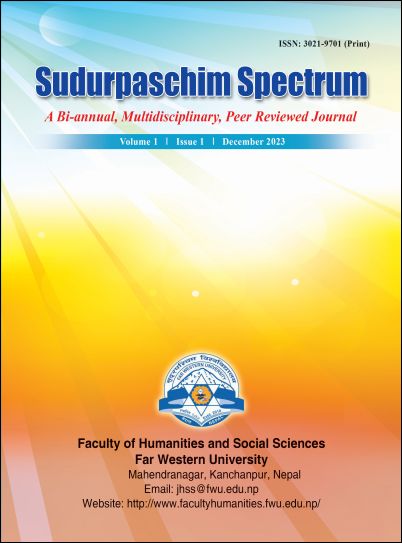Ethics of Memory in Manjushree Thapa’s Forget Kathmandu: An Elegy for Democracy
DOI:
https://doi.org/10.3126/sudurpaschim.v1i1.63387Keywords:
Ethics, forgiveness, politics, memory, moral witness, revealingAbstract
This paper is an attempt to explore the ethical use of memory in Manjushree Thapa’s Forget Kathmandu: An Elegy for Democracy (2005). In her book, Thapa critically observes the history of Modern Nepal and recounts the experiences of her visits to the war-ravaged regions of the Mid-Western hills during the Maoist insurgency. The study analyzes the narrative data from the text to see how the narrator remembers the impact of “bad politics” and the Maoist insurgency on the common people of the hinterlands of Karnali region. For this purpose, the study applies the memory theory of Avishai Margalit from The Ethics of Memory (2004). Margalit claims that too much memory is detrimental to the health of an individual as well as a society; so such excessive memory of traumatic experiences should be narrated and ventilated to bring about forgiveness and reconciliation. The paper contends that Manjushree Thapa in the selected text ‘condemns’ historical foul plays, attempts to reveal the anxieties of excessive thoughts induced by ‘bad politics’ and the civil war, at individual and collective levels, and contributes to healing and recovery. It recommends bringing the suppressed communal feelings from the ‘social unconscious’ into public discussion leading it to ‘social catharsis’ and reparation. Literature can play this role as a medium that will help society come out of ‘poisonous feelings’ like anger, hatred, and revenge, which ultimately contributes to the prevention of the repetition of violence.
Downloads
Downloads
Published
How to Cite
Issue
Section
License
Copyright (c) 2023 The Author(s)

This work is licensed under a Creative Commons Attribution-NonCommercial 4.0 International License.
This license enables reusers to distribute, remix, adapt, and build upon the material in any medium or format for noncommercial purposes only, and only so long as attribution is given to the creator.




